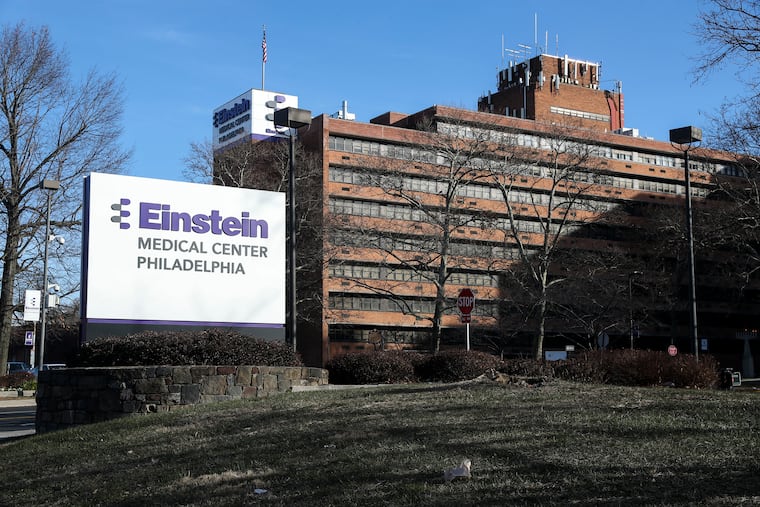Jefferson, Einstein say its North Philadelphia hospital is at risk without a merger
The Jefferson-Einstein filing said Einstein needs an infusion of up to $500 million for deferred maintenance and capital investments, and will continue to weaken without a merger.

After years of financial losses, Einstein Healthcare Network has no option but to merge with Thomas Jefferson University if its flagship North Philadelphia hospital is to have any chance of surviving in its current form.
That is a central argument that Jefferson and Einstein made in a federal court filing this week, as the two Philadelphia nonprofits attempt to overcome opposition to their merger plan from the Federal Trade Commission and Pennsylvania attorney general.
A hearing on the regulators’ preliminary injunction request is scheduled for Sept. 14 in U.S. District Court for the Eastern District of Pennsylvania. Einstein and Jefferson also face an FTC administrative proceeding, scheduled to start in January.
» READ MORE: Jefferson Health’s expansion hits a deep pothole with large COVID-19 loss
The Jefferson-Einstein filing painted a dire picture, declaring that Einstein, which since 2012 has had annual operating profits only twice, is on a path to financial failure, needs an infusion of as much as $500 million for deferred maintenance and other capital investments, and will continue to weaken, “as it is forced to cut services or close facilities.”
“Einstein was unable to identify any alternative buyer to Jefferson that possessed the financial strength and scale necessary to address Einstein’s financial problems,” the filing said. “No other potential strategic partners were willing and able to commit to keep EMCP [Einstein Medical Center Philadelphia] open with its current set of services.”
Unmentioned is the interest of Crozer-Keystone Health System’s owner, Prospect Medical Holdings Inc., in acquiring all or part of Einstein. Prospect’s intent was expressed as recently as June and detailed in a separate court filing.
The FTC alleged in its February complaint that the combination of Jefferson and Einstein would lead to higher prices for commercial insurers. This week’s pretrial memorandum estimated that prices would go up by 6.9% at Einstein’s general acute-care hospitals if they no longer competed with Jefferson hospitals. That would cost consumers $23.3 million a year, the FTC said.
In support of that contention, the FTC said that Einstein offered lower prices to an insurer, whose identity is redacted, if Jefferson’s Abington and Lansdale hospitals were excluded from a preferred tier of the insurer’s network.
» READ MORE: Temple’s sale of Fox Chase Cancer Center to Jefferson is scotched
As is common in antitrust cases, Jefferson and Einstein disputed the parameters that the FTC used to calculate the impact of the consolidation, arguing that additional hospitals should have been included in the analysis. For Einstein Philadelphia, the FTC’s competing hospitals are Temple University Hospital, St. Christopher’s Hospital for Children, Roxborough Memorial, Cancer Treatment Center of America, and Temple’s Jeanes Campus.
Competitors for Einstein Philadelphia should include Nazareth, Children’s Hospital of Philadelphia, Thomas Jefferson University Hospital, University of Pennsylvania, Penn Presbyterian, and Pennsylvania Hospital because they draw from the same geographic area. They also said the FTC’s market-share analysis was flawed because it is did not take into account where the patients live.
If that and similar corrections were made for the analysis of Einstein Medical Center Montgomery in East Norriton and MossRehab in Elkins Park, the FTC’s measure of market power would drop to a level that didn’t deserve such scrutiny, Einstein and Jefferson said.
The two health systems also disputed the FTC’s emphasis of the deal’s alleged impact on commercial insurers, given that most of Einstein Philadelphia’s patients have Medicaid or Medicare and have fewer options for care than those with commercial insurance.
Looming in the background is Independence Blue Cross, the largest health insurer in Southeastern Pennsylvania.
» READ MORE: Tower Health reports steep COVID-19 related losses
The FTC is asking the court “to ignore the clear risk to the health and welfare of North Philadelphia residents without commercial health insurance, who depend on [Einstein] for their hospital services, based on a flawed prediction of a price increase on commercial insurance companies like Independence Blue Cross,” the Einstein-Jefferson filing said.
Besides, the filing said, “insurers could readily exclude Jefferson and Einstein from their networks rather than accept a significant price increase,” especially because “Einstein is not a ’must-have’ provider for commercial health insurers,” given its large Medicare and Medicaid patient population.
The insurance argument is particularly noteworthy because Jefferson, which canceled its agreement to buy Fox Chase Cancer Center from Temple University, still has an agreement to buy Temple’s interest in Health Partners Plans Inc. a nonprofit Medicaid and Medicare insurer.
If Jefferson completes that deal and acquires Einstein, it will own 100% of Health Partners, putting it in a position to compete directly with Independence in the insurance market.
Jefferson chief executive Stephen K. Klasko told the trade publication HealthLeaders last year that health care could benefit from having more health systems in the insurance business, naming Kaiser Permanente, Intermountain Healthcare, and Pittsburgh-based UPMC as examples.
Jefferson, Einstein, and the FTC said they don’t comment on ongoing litigation.